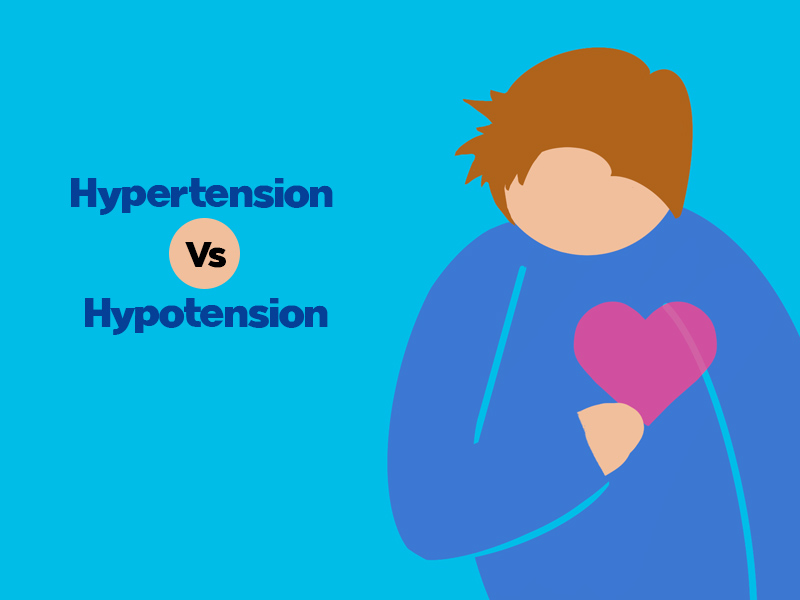
Blood pressure is one of the vitals on which your overall health depends. Heart is one of the main organs and its proper functioning is necessary to prevent chronic heart conditions that may turn fatal. Normal blood pressure levels signify that the flow of blood from your heart to all the organs is in the right manner. Blood pressure monitoring helps in identifying potential issues related to your heart. This world hypertension day, we will tell you about hypertension(high blood pressure) and hypotension(low blood pressure). Learn about their causes, symptoms and risk factors in this article.
Table of Content:-
What is Hypertension?
Let us begin with hypertension. It is the term given to high blood pressure. Nobody develops hypertension in days but this condition develops gradually over months or maybe years. In India, high BP is highly common due to several reasons. Only if you identify fluctuations in your blood pressure on time, you can prevent hypertension.

"The rise of hypertension in young people, especially in urban areas, is alarming and a matter of huge concern for two reasons -- a) uncontrolled hypertension can have fatal results such as heart attack or stroke, and b) it is a preventable lifestyle disease that can also make a person more susceptible to COVID-19, irrespective of age. Hypertension is a lifelong disease and preventing it is always better than trying to control it. Simple lifestyle changes can help one prevent or delay the onset of hypertension, including reduced salt intake in diet, limiting sodium and alcohol intake, eating a variety and heart-friendly foods such as vegetables, fruits, whole grains, fish and low-fat dairy. One must also avoid a sedentary life at all cost -- moderate exercise regularly can help a lot to gain optimum weight and shed extra weight. Manage stress through yoga and meditation and quit smoking." said Dr. Deepak Verma, Internal Medicine, Columbia Asia Hospital, Ghaziabad.
"Hypertension or high blood pressure has become a serious issue owin to the lifestyle we lead. Our preferences to junk food, irregular sleep patterns and stress are major contributors to this chronic illness. The high prevalence of uncontrolled hypertension in women leads to diverse pregnancy outcomes, including premature delivery, fetal growth restriction, fetal death, placental abruption and cesarean delivery. But, in men hypertension can result in many infertility issues such as having a lower semen volume, sperm motility, total sperm count, and motile sperm count. It’s essential that a couple, who are planning to conceive, first combat high blood pressure with a healthy diet and appropriate physical activity, maintain a healthy weight and practice stress management techniques." said Dr. Aswati Nair, Fertility Consultant, Nova IVF, New Delhi.
Symptoms of Hypertension
This is a silent condition that may not give noticeable warning signs and this is why many hypertension patients come to know about their health condition later. According to Dr. S.S. Sibia, Cardiologist, Director & Consultant at Sibia Medical Centre in Ludhiana, hypertension can also be caused due to seasonal changes and particularly in winter or cold season triggers high BP the most. The common symptom of one developing hypertension is headaches. Monitoring BP regularly is necessary to forestall underlying heart conditions.
Causes of Hypertension
There are two types of hypertension- primary and secondary. While primary hypertension is age-related, here are probable causes of secondary hypertension:
- Thyroid condition
- Kidney issues
- Adrenal gland tumour
- Birth defects in blood vessels
- Abuse or overuse of painkillers
- Regular consumption of birth control pills
- Drugs abuse
- Sleep apnea
Also Read: Long Working Hours Can Put You At Risk Of Hypertension, Know Preventive Tips From Doctor

Above are possible causes but you should also note the risk factors that can cause you hypertension. These are:
- Age
- Family History(if someone in the family has high BP)
- Obesity or overweight
- Smoking or drinking
- Physical inactivity
- Chronic stress
- Taking a high-sodium or low-potassium diet
Complications of Hypertension
Hypertension is not just one condition but it can give rise to a cluster of diseases. Untreated hypertension can cause heart attacks, stroke, metabolic syndrome, blood vessel complications, dementia, cognitive impairments, aneurysms, to name but a few.
What is Hypotension?

Let us now talk about hypotension. This term is for low blood pressure where the reading is lower than 90/60. If your BP range falls below this, you are a patient of hypotension. However, just like hypertension, hypotension also develops gradually and does give alerts from the initial stage to allow time to prevent its onset.
Symptoms of Hypotension
Here are some signs and symptoms of hypotension that you need to see to prevent low blood pressure.
- Extreme fatigue
- Dizziness
- Nausea
- Fainting
- Poor concentration
- Blurry vision

If you fail to identify these symptoms and don’t receive timely treatment, low blood pressure or hypotension can lead to shock. Hypotension is equally dangerous as hypertension and can prove to be fatal for the patient.
Also Read: Can Someone Have Both Low BP and High BP?
Causes of Hypotension
Here is the list of potential factors that can cause your blood pressure levels to drop heavily and lead to hypotension:
- Heavy blood loss
- Acute dehydration
- Existing heart condition
- Anaphylaxis or severe allergic reaction
- Pregnancy
- Deficiency of vitamin B12
Risk factors for Hypotension
- Age
- Type-2 Diabetes
- Certain drugs and medicines
- Parkinson’s disease
In case you don’t know, hypotension is more dangerous than hypertension. This is because apart from causing long-term illnesses, hypotension also affects your daily activities with bouts of dizziness and fatigue. In addition to this, hypotension condition can also affect blood oxygen levels by affecting the flow of oxygen n in the body. Over time, lack of oxygen can become life-threatening. If you get headaches with blurry vision, this could be due to low blood pressure situation.
Conclusion
Both hypertension and hypotension are bad for health. Since these do not exhibit prominent or exclusive symptoms, it becomes difficult to identify the problem and so, it develops into a lifelong threat. Keeping a regular check on your blood pressure is very important if you don’t want to get either of these conditions. Having an active and healthy lifestyle decreases the risk by twofold. You must eat healthily and be physically active for a healthy and disease-free life.
Read More Articles in Heart Health
Also watch this video
How we keep this article up to date:
We work with experts and keep a close eye on the latest in health and wellness. Whenever there is a new research or helpful information, we update our articles with accurate and useful advice.
Current Version
